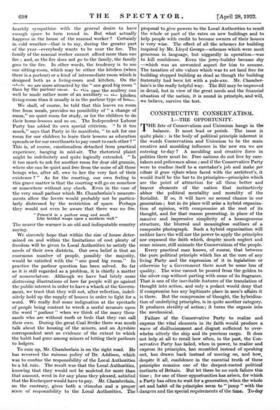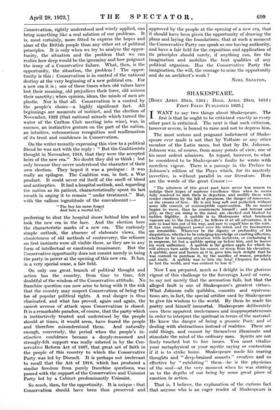CONSTRUCTIVE CONSERVATISM.
L—THE OPPORTUNITY.
THE fate of Conservatism and Unionism hangs in the balance. It must lead or perish. The issue is quite plain : is the body of -political principle inherent in the words Conservatism and Unionism to be the main creative and moulding influence in the new era we are entering to-day ? A moulding and creative force in politics there must he. Free nations do not live by care- takers andpolicemen alone ; and if the Conservative Party were to confine itself to a. caretaker's job and make per viltate it gran riftuto when faced with the architect's, it would itself be the bar to its principles—principles which are the point of attraction for all those better and braver elements of the nation that instinctively abhor the political mentality and morality of the Socialist. If so, it will _have .no second chance in our generation; but in its place will arise a hybrid organiza- tion of opinion, with compromise at the root of its thought, and for that season presenting, in place of the massive and impressive simplicity of a homogeneous structure, the blurred and meaningless outlines of a composite photograph. Such a hybrid organization will neither have the will nor the power to apply the principles nor expound the =faith which, despite much neglect and some misuse, still animate the Conservatism of the people.
Every practical man knows, of course, that between the pure political principle which lies at the core of any living Party and the expression of it in legislation or otherwise by a Government there must be some loss of quality. The wine cannot be poured from' the golden to the silver cup without parting with some of its fragrance. That is one of the inevitable features of the translation of thought into action, and only .a pedant would deny that if compromise has any legitimate place in men's affairs it is there. But the compromise of thought, the hybridiza- tion of underlying principles, is in quite another category. It produces sterility of action ; it turns the organic into the mechanical.
Failure of the Conservative Party to realize and express the vital -elements in its 'faith would • produce a wave of disillusionment and disgust sufficient to over- whelm utterly the ship and its precious cargo. It does / not help at all to recall how often, in the past, the Con- servative Party has failed, when in power, to realize and express its principles, has mumbled instead of speaking out, has drawn back instead of moving on, and how, -despite it all, confidence in the essential truth of these principles remains one of the deepest-rooted political /instincts of Britain. But let there-beano such failure this time ; for one of .these opportunities has arisen, for which a Party has oftento wait for a generation,-when the whole set and habit .otits principles seem to " jump " with the .dangers and the special requirements of the time. To-day Conservatism, rightly understood and wisely applied, can bring something like a. real solution of our problems. It is, most certainly, more fitted to express the hopes and aims of the British people than any other set of political principles. It is only when we try to analyse the oppor- tunity, the situation and the problem that we can realize how deep would be the ignominy and how poignant the irony of a Conservative failure. What, -then, is the opportunity, the situation, the problem ? The oppor- tunity is this : Conservatism is in control of the national destiny at the very beginning of a new political era. For a new era it is ; one of these times when old values have lost their meaning, old prejudices their force, old axioms their sanctity; when opinion, ideas, the minds of men are plastic. Nor is that all. Conservatism is a control by the people's choice—a highly significant fact. All beginnings are moments of instinct, and the election of November, 1922 (that national miracle which turned the water of the Carlton Club meeting into wine), was, in essence, an instinctive gesture on the part of the nation, an intuitive, subconscious recognition and reaffirmation of its trust and confidence in Conservatism.
On the writer recently expressing this view to a political friend he was met with the reply : " But the Coalitionists thought in November, 1918, that they were the accepted heirs of the new era." No doubt they did so think ; but only because they never understood the character of their own election. They hoped it was a prologue : it was really an epilogue. The Coalition was, in fact, a War product. It could never rid itself of the smell of blood and antiseptics. It had ahospital outlook, and, regarding the nation as • its patient, characteristically spent its last breath in urging it to remain " under treatment." But, with the callous ingratitude of. the convalescent :— " The boy his nurse forgot
And bore a mortal lot,"
preferring to shut the hospital doors behind him and to look the new era in the face. And the election bore the characteristic marks of a new era. The curiously simple outlook, the absence of elaborate views, the obsoleteness of old methods of controversy, the reliance on first instincts were all visible there, as they are in any form of intellectual or emotional renaissance. But the Conservative opportunity does not consist merely in being the party in power at the opening of this new era. It has, in a very special- sense, a fair field.
On only. one great. branch of political thought and action has the country, from time to time, felt doubtful of the wisdom of the Conservative attitude. No franchise question can now arise to bring with it the risk that the country may suspect Conservatism of being the foe of popular political rights. A real danger is thus eliminated, and what has proved, again- and again, the easiest avenue of attack upon- Conservatism is- closed. It is a remarkable paradox, of course, that the party which is instinctively trusted and understood by the people should at times, it would seem, have feared the people and therefore misunderstood them. And naturally enough, -conversely, the period when the people's in- stinctive confidence became a deeply-reasoned and strongly-felt support was really ushered in by the Con- servative Reform Act of 1867, that great act of faith in the people • of this country to which the Conservative Party was led by Disraeli. It is perhaps not irrelevant to recall that the At of 1918, which has produced a similar freedom from purely franchise questions, was passed with the support of the Conservative and Unionist Party led by a Cabinet predominantly Unionist.
So much, then, for the opportunity. It is.unique : that Conservatism should- have been thus preserved and approved by the people at the opening of a new era, that it should have been given the opportunity of drawing the plans and laying the foundations, that at such a moment the Conservative Party can speak as one having authority, and have a fair field for the exposition and application of its principles should surely, if anything can, fire the imagination and mobilize the best qualities of any political organism. Has the Conservative Party the imagination, the will, the courage to seize the opportunity and do an architect's work ?
NOEL SKELTON.



















































 Previous page
Previous page